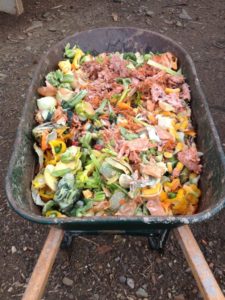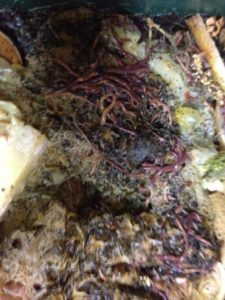How Much to Feed Compost Worms
 What do Red Wiggler Worms Eat?
What do Red Wiggler Worms Eat?
Learn what Vermicomposting Worms eat and what they don't
Worm composting (Vermicomposting) is a form of composting in which you feed your veggie food scraps to a specific type of earthworm, red wigglers. What do red wiggler worms eat? This article will give you an overview of feeding your worms.
For more info on getting started with worm composting check out these related articles:
- Why You Should Worm Compost
- Getting Started with Worm Composting
- How to Make a Worm Bin
What Do Red Wiggler Worms Eat? What Do You Feed Composting Worms?
One of the major reasons to worm compost at home is to responsibly dispose of your food waste (instead of sending it to a land fill). So, what do composting worms eat? Worms eat tiny, invisible, bacteria that feed on the food scraps that you add to your vermicomposting bin. The worms also eat the food scraps and worm bin bedding. You can feed your composting worms any vegetable food scraps including egg shells and coffee grounds.
What do Worms like to Eat?
I have found that composting worms prefer some vegetable scraps over others:
- Melon rinds. Cantaloupe, honey dew, watermelon, etc. They love sweet foods
- Non-citrus fruit. berries, apples, pears, etc.
- Squashes. The soft flesh is easy for them to eat
Foods that Composting Worms Don't like as much
Red Wiggler Composting Worms will still eat these foods but in large quantities they could harm your composting worms. NOTE: I frequently put small amounts of these foods in my worm composting bin without any problems.
- Citrus Fruits: oranges, limes, lemons, etc (large quantities of citrus can burn a worm's sensitive skin)
- Onions and garlic. These can also burn their skin in large quantities.
- Bread: Bread doesn't harm your composting worms but it can be tricky to compost because it molds quickly introducing a new element to the bin.
What NOT to feed your Worms
Remember composting worms are vegetarian.
- Meat
- Dairy
- Oil
- Cooked food. Cooked food often has seasonings, especially salt, which can harm your worms. To responsibly dispose of your cooked food scraps (and get some great eggs), get some backyard chickens!
 "Extra" Food for Red Wiggler Worms
"Extra" Food for Red Wiggler Worms
Things you can add to your vermicomposting bin that you might not necessarily think of.
- Dryer lint – It is made up of mostly fibers from your clothes
- Egg Shells – although they take a very long time to break down.
- Paper Towels – as long as you have only used them to clean drink spills, etc. Do not put paper towels that have chemicals on them in your worm bin.
- Pet Hair – you will want to be careful with this one. In small quantities I have found that it works well but in large quantities pet hair can easily clump together making it harder for the composting worms to break it down.
- Tea bags and coffee filters – Go ahead and throw them in as well, they are just paper!
Feeding Your Worms – Procedure for How to Feed Red Worms
Worms can eat roughly half their weight everyday. You can use this fact to calculate how much you should be feeding your worms. When you start your bin you will usually start with 1 pound of worms. So, they will be able to eat roughly ½ a pound of food scraps per day assuming ideal bin conditions. If you want your worms to eat faster, chop the food scraps into small pieces ahead of time and throw them int he freezer overnight. Chopping (some people even use a blender) increases the surface area of each piece of food making it easier for the worms (and the bacteria) to eat. Freezing and then thawing your worm food breaks the cell walls of the food which makes it more mushy (when thawed) and easier for the composting worms to eat.
Earth worms do not have teeth. They have very small gizzards (like chickens) that they use to grind up their food. Because they don't have teeth, they can not bite off chunks of the food scraps. Therefore, they need to wait until the food scraps begin to rot and get soft and mushy. This is why freezing and thawing your food scraps is helpful.
 Here are 5 tips on the frequency of feeding your worms
Here are 5 tips on the frequency of feeding your worms
- Wait until your worms have finished their food before feeding your worms again. This is easily done by simply checking the worm bin. Overfeeding can bring unwanted pests.
- If you keep your worm composting bin indoors you will want to manage it a bit more carefully to ensure that you never get fruit flies or foul odors. An indoor bin should be checked weekly and usually fed weekly (see above).
- If you keep your worm bin outdoors you can feed them a little more at each feeding and go a little longer between feedings. Plan to feed your outdoor composting worms about once every 2 or 3 weeks.
- Be careful not to overfeed your worms. If you add too much food for your worms they will not be able to eat it before it rots. Rotting food can attract fruit flies and cause a bad odor. Another tip to avoid fruit flies and odor is to be sure to always bury your food scraps under the worm bin bedding when feeding your worms.
- You do not need a worm sitter. If you go out of town (even for up to a month!) your worms will be fine. Be sure to feed them before you leave and if they are outdoors you can feed them a little more than usual. Remember, worms will eat their bedding as well.
Enjoy vermicomposting with your red wiggler composting worms!
Source: https://www.wormcompostinghq.com/feeding-your-worms/
 "Extra" Food for Red Wiggler Worms
"Extra" Food for Red Wiggler Worms  Here are 5 tips on the frequency of feeding your worms
Here are 5 tips on the frequency of feeding your worms
0 Response to "How Much to Feed Compost Worms"
Publicar un comentario